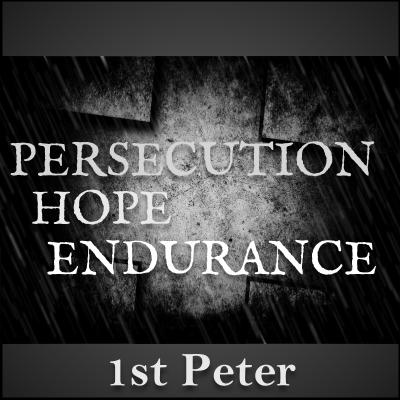1 Peter – 1 Peter 3:21-22- 11 of 18
SERMON SUMMARY
First Peter was written to persecuted Christians who were scattered throughout what is now modern day Turkey. Peter wrote to encourage them to maintain their hope in the midst of their trying circumstances. Today we learn what Christian baptism symbolizes and role in Christian discipleship (1 Peter 3:18-22). In answering questions about baptism, it’s important that we allow the Bible to be our authority, not what we were taught growing up. So, here are several important questions:
[1] How does Noah and the ark correspond to Christian baptism? I think that Peter is suggesting that God’s deliverance of Noah and his family on the ark was a picture of the salvation that God would one day bring about for all of mankind through Jesus’ death on the cross. Both involve saving people from God’s judgment. This kind of foreshadowing is referred to as “typology”. Peter saw Noah’s ark as a “type” of Christ in that the ark corresponded in a physical way to what Jesus did for us spiritually (v. 21). Just as Noah and the ark pictures spiritual salvation, so does Christian baptism. And, they both involve the water. Baptism by immersion is a visual portrayal of what Jesus has done for us: when Jesus died, we died with him. When Jesus was buried, so were we. When Jesus rose from the dead, we rose from the dead with him to live a new quality of life.
[2] Is Peter saying that the physical act of baptism confers on us forgiveness of sin? At first glance, that seems to be what Peter is saying (v. 21a). But as we continue reading, Peter adds a clarifying phrase: “not the removal of dirt from the flesh”. Baptism is “a response to God from a clean conscience which comes to us as a result of the resurrection of Jesus Christ.” Baptism is a ceremony, a public confession of a commitment to no longer serve sin. Baptism, Peter clarifies, is a response to God flowing from a conscience that has already been cleansed by the Holy Spirit through faith. Just as Jesus proclaimed His triumph over sin and death through His own suffering and death on the cross, believers proclaim their triumph over sin and death through water baptism. Baptism itself doesn’t save anyone; it is an outward expression of our faith in Jesus who died on the cross, was buried, and rose from the dead in triumph over sin and death (Acts 10:44-48; Ephesians 1:13-14). In Luke 23:39-43, Jesus promised heaven to an unbaptized believer.
[3] What is the proper mode of baptism? Everyone agrees that water is involved, but some churches sprinkle, some pour, and some immerse. The question is this. Which mode best reflects the biblical data? At TCC we teach baptism by immersion. Why do we do that? There are at least five reasons:
- Jesus himself was baptized by immersion. When Jesus was baptized, Jesus “came up from the water” (Matthew 3:16).
- The Ethiopian eunuch was baptized that way. (Acts 8:36-39)
- The basic meaning of the Greek word, baptizo, is to immerse. The Greek language has words for sprinkle and pour, but they are never used to describe baptism.
- Immersion best symbolizes a burial and resurrection. Baptism by immersion graphically portrays a person going down into the watery grave and then being raised to new life. Neither sprinkling nor pouring can adequately capture this symbolism.
- The founders of many denominations which now sprinkle or pour (Luther, Calvin, Wesley), acknowledge that immersion was the universal practice of the ancient church. “Immersion, and not sprinkling, was unquestionably the original, normal form of baptism. Immersion shows the very meaning of the Greek word baptize.”
(Schaff’s History of the Apostolic Church, p.568)
[4] Who are the proper subjects of baptism? This one is easy. Everyone who has believed in Christ, because the Biblical expectation is that all of us who profess faith in Christ will follow him in discipleship. The Scriptural order is always believe and then be baptized. Nowhere in the New Testament are infants commanded to be baptized nor is there a clear example of an infant being baptized in the New Testament. (So here at TCC, in keeping with the Scriptures, we do not baptize infants. We do however have child dedication services, where we dedicate both parents and their children to God’s care and service. There is biblical support for that.)
[5] Should those where baptized before they exercised personal faith in Christ be re-baptized? That was my situation. I was baptized at a time when I didn’t understand what it meant to be a Christian. In college I came to faith in Christ, and decided to be baptized by immersion. So as to whether you should be re-baptized, that’s a decision between you and God, but if you ask me, I think you should go for it!
APPLICATION / CHALLENGE
- If you have not placed your trust in Jesus Christ as your Savior, do so today! If you would like to know God personally, contact us here (connect.tcc.org) Scroll down to the Ministry Information Request section and mark the first or second checkbox. We look forward to helping!
- If you have not been baptized as a believer, you should be! (Matthew 28:18-20). To learn more about baptism and sign up visit here.
TAKE ONE STEP
Each week, write down one doable concrete step of obedience, small or large, that you will put into practice this week. (James 1:22: “But prove yourselves doers of the word, and not merely hearers who delude themselves.”)


